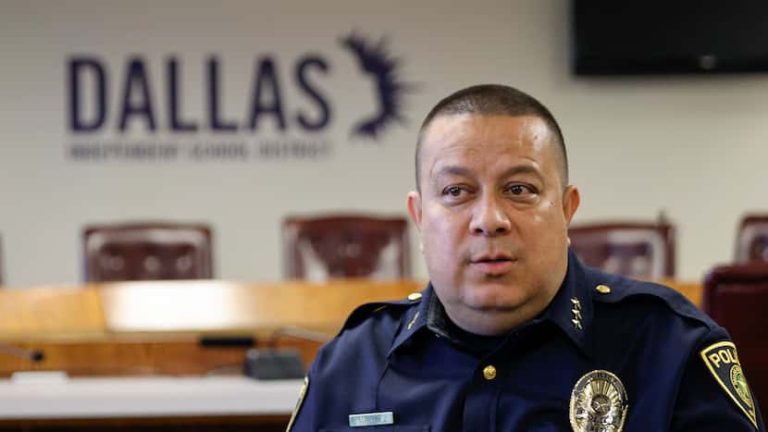Dallas School Police Chief Albert Martinez said Monday that the recent shooting at Wilmer Hutchins High School was caused by both human error and a systems failure.
Earlier this month, a teenage suspect brought a gun onto campus despite a check-in procedure that was supposed to involve metal detectors and baggage screening.
Martinez said district rules were not being strictly followed.
“In this case, the metal detector went off and no protest was filed. There were no secondary actions taken that should have been taken, and that’s our concern,” Martinez said.
The student is accused of using the gun to shoot and wound a classmate. Dallas Independent School District police officers responded to a classroom at Wilmer Hutchins School on April 12 and found the victim shot in the thigh. The officer applied a tourniquet until other emergency personnel arrived, according to an arrest warrant affidavit.
Martinez praised officers for their quick action in assisting the rescue.
“We don’t want to have the same stigma as the Uvalde incident,” he said, referring to the hundreds of police officers who swarmed Robb Elementary School but failed to act immediately to stop the shooter.
School district officials said they will be strengthening training procedures and protocols to keep students safe.
Dallas Independent School District leaders are increasing staffing at the arrival and dismissal of students, retraining staff in backpack searches and metal detectors and revising schedules to allow more people to monitor students.
“There will be standards,” Martinez said. “Anything less will not be acceptable.”
Martinez recently took over the district’s police department after serving many years with the Dallas Police Department.
The police chief said when students arrive at school this week, they should see even more thorough adherence to the district’s protocols.
Dallas students are required to wear clear backpacks, in addition to metal detectors and metal detection wands.
Wilmer Hutchins High School students held a walkout in the aftermath of the shooting, demanding that the school district do more to protect them.
Several teens expressed frustration that metal detectors at their school were not always used.
“There are metal detectors and bars, but finally they [them] “This is what should happen after something bad happens,” said Yanelly Gamino, a student who took part in the strike.
Shortly after the Wilmer Hutchins shooting, a new shooting occurred on a DISD campus.
Last week, a Roosevelt High School staff member was driving two football players home when a drive-by shooting occurred outside the school, wounding two students. It was after school, but the staff member drove the students back to Roosevelt to quickly call for help.
The school district canceled classes at that campus on Friday after receiving information about a safety threat.
Officials expressed concern that difficult issues in the local community were spilling over onto university campuses.
“My biggest concern is the mental health of our students,” Martinez said. “The homelessness and mental illness that we see on the streets, we see in our schools.”
Disruptions in students’ home lives can carry over into their school lives, he said.
“It’s our job to find it, identify it and remove it from the school experience,” Martinez said. “The majority of our students want nothing to do with it. They want to get an education.”
Reporter Lana Ferguson contributed to this story.
The DMN Education Lab deepens coverage and conversation about pressing education issues critical to the future of North Texas.
The DMN Education Lab is a community-funded journalism initiative supported by Bobby and Lottie Lyle, Texas Community Foundation, Dallas Foundation, Dallas Area Chamber of Commerce, Dee Dee Rose, Garrett and Cecelia Boone, Meadows Foundation, Murrell Foundation, Solutions Journalism Network, Southern Methodist University, Sidney Smith Hicks and The University of Texas at Dallas. The Dallas Morning News retains full editorial control of Education Lab journalism.

